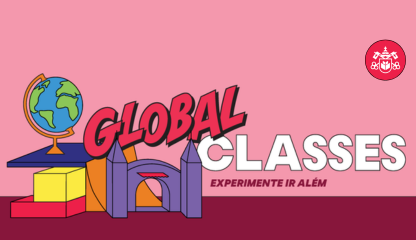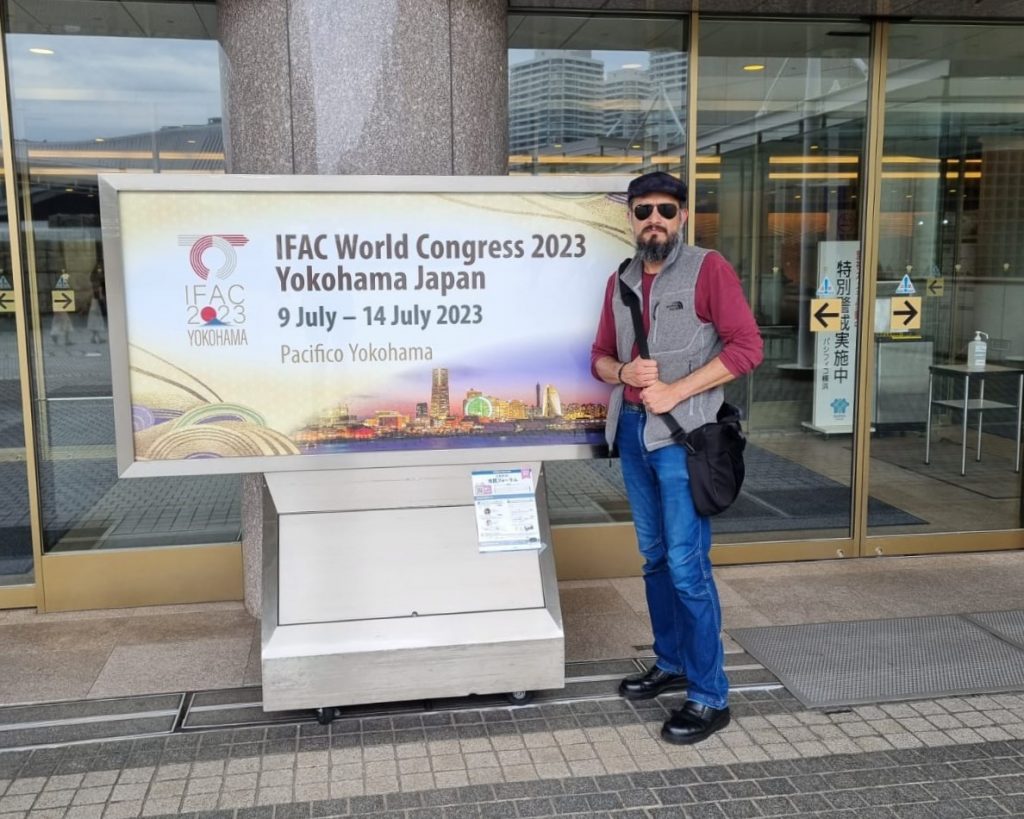Você sabia que estudar em um ambiente internacional é possível aqui na PUCPR?
Com o programa Global Classes PUCPR, o estudante tem a oportunidade de fazer disciplinas em diferentes idiomas e compartilhar experiências com estudantes internacionais, sem precisar sair do Brasil. Portanto, se está buscando enriquecer sua formação, fortalecer seu currículo e se preparar para o mercado mundial, o Global Classes foi feito para você!
Com professores experientes, as disciplinas do programa são disponibilizadas em três níveis diferentes de proficiência para os cursos da Escola Politécnica:
- ● GCL1 – Level 1: São disciplinas regulares das matrizes que fazem uso básico do idioma. As aulas e as avaliações são em português, com uma introdução suave ao idioma internacional nos materiais de apoio e algumas atividades. Estas disciplinas aparecem naturalmente ao longo das grades dos cursos nos horários regulares dos respectivos períodos.
- ● GCL2 – Level 2: Uso misto de português e idioma internacional, alternando conforme a disponibilidade e interesse do professor e dos estudantes. Já é uma disciplina que demanda inscrição por parte do estudante.
- ● GCL3 – Level 3: Material didático e bibliográfico em idioma internacional. Aqui você já terá aulas, discussões e avaliações completamente em inglês. É uma disciplina que demanda inscrição por parte do estudante, sendo que aqui você terá como colegas estudantes intercambistas dos outros países. Em sua grande maioria são disciplinas realizadas em inglês.
Por que participar do Global Classes?
O Global Classes não é apenas “aula em outro idioma”; é uma verdadeira imersão em um ambiente acadêmico internacional. Imagine participar de discussões, fazer trabalhos em equipe e aprender terminologias específicas da sua área em um idioma estrangeiro? Isso abre portas para uma série de oportunidades e desenvolve habilidades que farão a diferença na sua trajetória profissional.
Alguns dos benefícios que o Global Classes traz para você:
- ● Formação de impacto global: Ao cursar uma disciplina internacional, você enriquece seu currículo com uma formação diferenciada, alinhada às demandas do mercado global. Isso demonstra que você tem experiência e preparação para lidar com desafios além das fronteiras.
- ● Domínio técnico em outros idiomas: Aprender a linguagem técnica do seu curso em outro idioma, não só fortalece seu conhecimento, como também te deixa mais seguro para trabalhar em qualquer lugar do mundo.
- ● Networking internacional: Você terá a chance de estudar com pessoas de diferentes países, sem precisar sair do Brasil. Esse ambiente multicultural amplia suas perspectivas e pode abrir portas para contatos e parcerias internacionais que vão além da sala de aula.
- ● Desenvolvimento acadêmico: Para quem busca uma experiência mais profunda, o programa incentiva o desenvolvimento de pesquisas e publicações em uma esfera internacional, colaborando com outros estudantes e professores para enriquecer seu perfil acadêmico e profissional.
As disciplinas Global Classes são alternativas para quem não tem possibilidade de fazer intercâmbio, pois pode cursar várias ao longo da graduação e conhecer pessoas de diferentes nacionalidades.
Também são indicadas para quem vai fazer intercâmbio, pois o estudante se coloca em uma situação similar a que vai encontrar quando viajar, servindo, portanto, de preparação para o futuro contexto acadêmico.
Como faço e quando devo me inscrever no Global Classes? Preciso de um conhecimento específico?
Para aderir ao Global Classes, basta o estudante incluir a disciplina que deseja em sua matrícula durante o período de ajuste acadêmico, conforme o prazo definido no calendário acadêmico de cada semestre (https://www.pucpr.br/estudante/graduacao/calendario-academico/ ). E não se preocupe: participar do programa não gera nenhum custo adicional para estudantes da PUCPR.
Quanto ao idioma, não é necessário apresentar nenhuma certificação ou teste. Para uma disciplina GCL3 é importante ter boa compreensão do inglês, ler, falar e se sentir confortável para acompanhar discussões e realizar trabalhos no idioma.
Aqui a dica é participar das duas primeiras semanas de aula, conversar com o professor, conhecer o plano de ensino, os colegas de turma – ou seja, fazer um test drive para ver se é viável – e então confirmar a inclusão (ficando atento ao prazo final de ajuste).

Quais serão as disciplinas para o 1º semestre de 2025?
Veja abaixo as opções de disciplinas Global Classes Level 3 que fazem parte do portfólio da Escola Politécnica para o 1º semestre de 2025:
- ● Innovating Lean Six Sigma (6 ECTS – 60 hours)
Professor: Rafael Rodrigues Guimaraes Wollmann
The Innovating Lean Six Sigma course is for all those engineering, IT and business students interested in problem solving and continuous improvement. Besides considering the foundation of Lean Six Sigma, this course considers Leadership, Culture, Business Metrics, Project Selection and Data-Driven Management. In the end of the semester, students will be able to manage processes – in any kind of organizations – to solve complex problems and continuously improve business performance. - ● AI-Driven Design Thinking for Business Software Solutions (6 ECTS – 60 hours)
Prof Evandro Alberto Zatti
Syllabus: The AI-Driven Design Thinking for Business Software Solutions course is for all IT and business students interested in agile software design supported by generative AI. The course aims to design and model a business information system through the steps of the Design Thinking methodology. During execution, possibilities for prompts that can support achieving the objectives of each stage will be explored. At the end of the semester, the student will be able to lead a software project making effective use of Design Thinking techniques and tools, as well as developing more assertive prompts to be used with chatbots based on generative AI. - ● Artificial Intelligence and Machine Learning (6 ECTS – 60 hours)
Professor: Victor Henrique Alves Ribeiro
Syllabus: This course is from the Mechatronics Engineering Department and is offered for studies at the Polytechnic School. Students will understand the basic concepts of an intelligent system, the tools, their components, their structure, and their operation. They will also identify how these technologies fit into value creation in the digital transformation. Topics: Evolutionary and bio-inspired Algorithms: parametric model, cost function, bio-inspired optimization, evolutionary optimization. Fuzzy Systems. Artificial Neural networks, Naive Bayes, Decision Trees, Support Vector Machines, linear regression, logistic regression. Machine learning: supervised learning, unsupervised learning, reinforcement learning, data processing, image processing, text processing. Ethical aspects of artificial intelligence. - ● Information Technology Management (6 ECTS – 60 hours)
Professor: Marco Antônio Paludo
Syllabus: This course is open for all those Information Technology (IT), engineering and business students interested in Information Technology Management. The main topics are: IT Governance, Service Management, Technological Resources Management, Risk Management, Outsourcing and Offshoring. Students analyze organizational structures and identify the relationship that the Information and Communication Technology (ICT) area has with other departments, aiming to promote alignment with the company’s top management. They also analyze approaches to ICT Governance and Service Management. In the end, they are able to develop ICT Strategic Plans that guide the actions of the ICT area in the medium and long term, in accordance with Corporate Governance. - ● Organizational Engineering (6 ECTS – 60 hours)
Professor: Fernando Deschamps
Syllabus: The Enterprise Engineering course of the Polytechnic School introduces students to organizational systems as complex adaptive systems (CAS) that may be rationally designed. It discusses the relationships among the elements of the socio-technical approach in the conception of these systems and uses contingency theory as a driver for this process. In the end, students shall be able to design new organizational systems or improve existing ones, integrating elements such as goals, people, processes, structure, technology and environment. - ● Engineering Application in Data Science (6 ECTS – 60 hours)
Professor: Matheus Beltrame Canciglieri
Syllabus: The Engineering Application in Data Science course is specifically designed for students in engineering, IT, and business who are new to the field of data science. It aims to provide a solid foundation by introducing fundamental concepts and techniques in data science, with a particular focus on their practical application in engineering. Throughout the course, real-world examples and case studies will be explored to enhance students’ comprehension and practical skills. By the end of the course, students will have gained the ability to effectively apply data science methodologies, including statistical analysis, to solve complex problems and improve operational performance in various organizational contexts. - ● New trends on planning and management for engineers (3 ECTS – 30 hours)
Prof Ricardo José Bertin
Syllabus: New trends of planning and management for engineers is for students interested in exploring approaches like Agile Project Management, Lean Construction, and Data-Driven Decision Making. Dive into cutting-edge strategies for sustainable practices, risk management, and leadership in engineering projects or any other. Combine those and make your own strategy. - ● Product development in the food industry: processes and trends (4 ECTS – 45 hours)
Professor: Cinthia Bittencourt Spricigo
Syllabus: Innovation in industrialized food products, with high sensory and nutritional quality, is a challenge for multi-professional teams. This course is aimed at students from different areas interested in learning about the processes involved in the development of industrialized food products (myths and truths) and does not require prior knowledge of food chemistry or biochemistry. Through the study of real cases and laboratory practices, the student experiences the sequence of steps from product development to sensory analysis tests. At the end, the student can integrate the legal and quality requirements to the creation of the formulation, the definition of processing and packaging and the product shelf-life. Study topics: 1) Demands for healthiness and sustainability in processed foods: functional foods, local and organic production, logistical challenges, minimal processing, smart packaging. 2) Food development stages: requirements gathering, formulation creation, conservation process definition, legal requirements, sensory analysis. - ● Scientific Research & Analysis (6 ECTS – 60 hours)
Professor: Cinthia Bittencourt Spricigo
Syllabus: In this course, students develop their ability to scientifically address real-world problems in the field of engineering. By the end of the course, students will be able to conduct research and document it independently, including performing a state-of-the-art review, selecting the most appropriate methodology for the research question, and analyzing results in a well-founded manner. The main study topics are: Knowledge and science, Scientific methods, Classification of scientific research, Collection of scientific data, Analysis of scientific data, Documentation of scientific research, Results and conclusions of scientific research. - ● Cosmetics technology (6 ECTS – 60 hours)
Professor: Francine Valenga
Syllabus:The Cosmetic course is designed to students who have interest in exploring the diverse and fascinating field of cosmetics. This course offers a blend of theoretical knowledge and practical application, allowing students to delve into concepts such as the presentation of shapes, safety considerations, expected effects, raw materials, and manipulation techniques. Throughout the course, students will actively engage in laboratory classes where they will gain hands-on experience in producing various cosmetics for personal use. - ● Fundamentals of Indoor Air Quality (3 ECTS – 30 hours)
Professor: Marcos Batistella Lopes
Syllabus: This course is designed for students interested in gaining an understanding of the key factors influencing indoor air quality. The curriculum focuses on the evaluation of indoor air quality by analyzing the effects of the urban microclimate and by applying relevant standards and regulations to ensure healthy indoor environments. Throughout the course, students will utilize both empirical methods and computer simulations to assess indoor air quality. By the end of this course, students will be able to: understand the primary pollutants and factors that affect indoor air quality; apply scientific methods and tools for monitoring and improving air quality; evaluate ventilation and mitigation systems within the context of regulatory standards; use simulations and analytical techniques to assess and enhance the air quality in various environments.
Também é possível fazer disciplinas de outros cursos da Universidade, desde que a coordenação do curso autorize a validação da carga horária eletiva.
Para conhecer todas as opções de disciplinas Global Classes PUCPR, para o primeiro semestre de 2025, visite o site.
Mais informações sobre o Global Classes estão na página oficial do programa em https://globalclasses.pucpr.br/ e outras dúvidas frequentes estão respondidas no FAQ em https://globalclasses.pucpr.br/wp-content/uploads/2024/09/Global-Classes_FAQ_03.pdf


